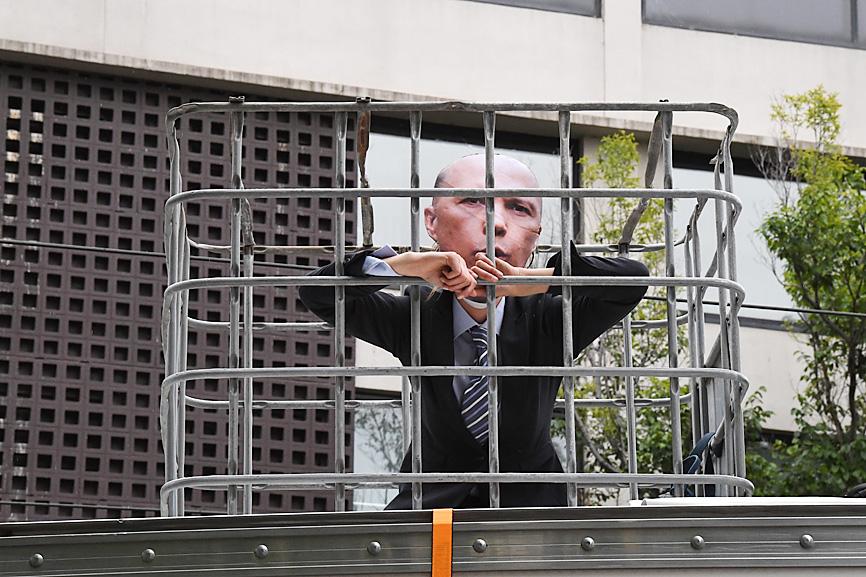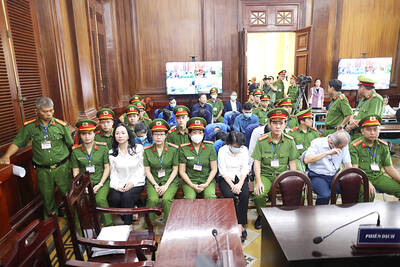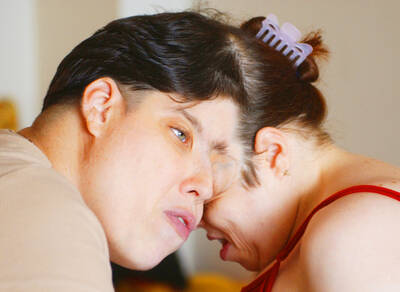The Australian government has said it makes no apology for dramatically accelerating visa cancelations, as it faces an increasing backlash in New Zealand after the policy triggered the deportation of a 15-year-old boy.
Pressure is mounting within New Zealand for the government to condemn Australia as a “rogue nation” in breach of human rights following the minor’s deportation.
The teenager was sent to New Zealand under the controversial policy by which the Australian government has been deporting non-citizens determined to have a “substantial criminal record” under a character test within the Australian Migration Act.

Photo: EPA-EFE
Australian Minister for Home Affairs Peter Dutton, who last week described the transfer of deportees as “taking the trash out” to “make Australia a safer place,” yesterday told parliament he was “proud of this government for the way in which we have kicked these people out of our country.”
Without detailing any specific cases, including the minor’s deportation, Dutton said the government had a policy of “canceling visas of dangerous criminals, of people that have committed serious offenses against Australian citizens.”
He said that the coalition had changed the law in 2014, “because we were quite amazed when we came in to government and saw the fact that very few people, particularly those who had committed the most heinous offenses against children, and women and men in this country, were allowed to stay in our country and to repeat those offenses against further victims.”
“So we make no apology for having ramped up that program and done it in a dramatic way,” Dutton said.
He added that the Australian government had been “able to cancel 309 visas for rape and other sexual offenses” during Australian Prime Minister Scott Morrison’s and his time in the immigration portfolio.
He said there were just 43 similar cancelations in the previous six-year period.
More broadly, Dutton said that Australia had “canceled now the visas of 6,300 non-citizen criminals,” but he did not break down these figures by nationality or offense type.
“I am proud of this government for the way in which we have kicked these people out of our country. They will not offend again against Australian women and children,” he said.
Dutton’s defiant speech came after New Zealand Prime Minister Jacinda Ardern repeated her strenuous opposition to the deportation policy, while being clear that Australia was operating “within their rights.”
She has also resisted suggestions that it has damaged the trans-Tasman alliance, saying the relationship between the two countries was “excellent.”
However, the deportation of the 15-year-old — which Ardern was made aware of by media on Monday — has inflamed tensions and increased pressure on the prime minister to take a stronger stance against Australia.
On Radio New Zealand’s Morning Report program yesterday, New Zealand lawmaker Golriz Ghahraman said that Australia was behaving like an “outlier” and needed to be treated as one.
“They need to know they are now damaging their relationship with us, that being a traditional ally and trading partner doesn’t mean that we will continue to be an ally and partner to them as they treat us with absolute disdain in this way,” she said.
The deportation was against the “rule of law and a commitment to human rights,” and should be taken to the UN, she said.
“It is time for all what we call like-minded nations to recognize that Australia is actually behaving like a rogue nation, as we call countries who very consistently flout human rights laws, and raise this in our international forums, have our allies join together with us to condemn this and put pressure on Australia to start behaving like a good global citizen,” she said.
New Zealand lawmaker Gerry Brownlee said that, without knowing the boy’s circumstances, at face value the deportation was “pretty appalling.”
New Zealand Children’s Commissioner Andrew Becroft wrote on Twitter that he had “serious questions” about the deportation, though he was proud of New Zealand “for putting the child first.”
New Zealand and Australia had both signed the UN Convention on the Rights of the Child “and are required to put the best interests of the child first in making decisions about them,” he wrote. “What led Aus to decide his best interests were better served by deporting him here? Was it a principled decision, or just convenient?”
New Zealand Minister for Foreign Affairs Nanaia Mahuta yesterday confirmed that Wellington had been had been notified on Wednesday last week about the minor’s return.
News Web site Stuff has reported that the teenager is now in a managed isolation facility.

Republican US lawmakers on Friday criticized US President Joe Biden’s administration after sanctioned Chinese telecoms equipment giant Huawei unveiled a laptop this week powered by an Intel artificial intelligence (AI) chip. The US placed Huawei on a trade restriction list in 2019 for contravening Iran sanctions, part of a broader effort to hobble Beijing’s technological advances. Placement on the list means the company’s suppliers have to seek a special, difficult-to-obtain license before shipping to it. One such license, issued by then-US president Donald Trump’s administration, has allowed Intel to ship central processors to Huawei for use in laptops since 2020. China hardliners

A top Vietnamese property tycoon was on Thursday sentenced to death in one of the biggest corruption cases in history, with an estimated US$27 billion in damages. A panel of three hand-picked jurors and two judges rejected all defense arguments by Truong My Lan, chair of major developer Van Thinh Phat, who was found guilty of swindling cash from Saigon Commercial Bank (SCB) over a decade. “The defendant’s actions ... eroded people’s trust in the leadership of the [Communist] Party and state,” read the verdict at the trial in Ho Chi Minh City. After the five-week trial, 85 others were also sentenced on

Conjoined twins Lori and George Schappell, who pursued separate careers, interests and relationships during lives that defied medical expectations, died this month in Pennsylvania, funeral home officials said. They were 62. The twins, listed by Guinness World Records as the oldest living conjoined twins, died on April 7 at the Hospital of the University of Pennsylvania, obituaries posted by Leibensperger Funeral Homes of Hamburg said. The cause of death was not detailed. “When we were born, the doctors didn’t think we’d make 30, but we proved them wrong,” Lori said in an interview when they turned 50, the Philadelphia Inquirer reported. The

RAMPAGE: A Palestinian man was left dead after dozens of Israeli settlers searching for a missing 14-year-old boy stormed a village in the Israeli-occupied West Bank US President Joe Biden on Friday said he expected Iran to attack Israel “sooner, rather than later” and warned Tehran not to proceed. Asked by reporters about his message to Iran, Biden simply said: “Don’t,” underscoring Washington’s commitment to defend Israel. “We are devoted to the defense of Israel. We will support Israel. We will help defend Israel and Iran will not succeed,” he said. Biden said he would not divulge secure information, but said his expectation was that an attack could come “sooner, rather than later.” Israel braced on Friday for an attack by Iran or its proxies as warnings grew of